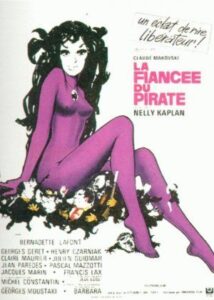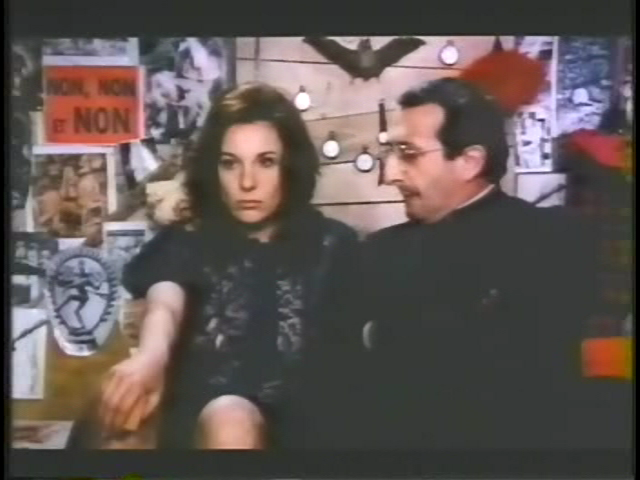“Things’ve changed. Got any money for me?”
|

Synopsis:
When her mother dies, a gypsy girl named Marie (Bernadette La Font) — who for years has been treated as the town slut — begins charging the boorish villagers for her sexual favors; soon she embarks upon an even more elaborate plan of revenge.
|
|
Genres, Themes, Actors, and Directors:
- Black Comedy
- Character Arc
- Feminism and Women’s Issues
- French Films
- Gypsies
- Prostitutes and Gigolos
- Revenge
- Strong Females
Review:
This most unusual erotic black comedy — the directorial debut of Nelly Kaplan — tells the satisfying tale of a beautiful gypsy girl who manages to single-handedly transform herself from victim to victor, leaving plenty of sweet justice in her wake. While the grotesque opening scenes are hard to stomach (the unenlightened townsfolk treat Marie literally like chattel), her eventual triumph makes the rocky beginning worth sitting through. It’s rather broad satire, but the point is well-made that hypocrisy will eventually out, with everyone ultimately paying for his or her dirty desires. La Font is wonderful in the lead role; she’s ferocious in her late-earned dignity, and displays enormous satisfaction both in the transformation of her tin shack into a cozy space, and in the power she knows she’s accumulated over her piggish neighbors. It’s a delight to watch Marie pursue her plan with such calculated tenacity.
Redeeming Qualities and Moments:
- Bernadette La Font as Marie

- A satisfying tale of feminist growth and revenge

- The hilarious ending

Must See?
Yes, as a most unusual French film. Listed as a Personal Recommendation in the back of Peary’s book.
Categories
Links:
|
One thought on “Very Curious Girl, A (1969)”
First viewing. Agreed, must-see, for reasons stated.
Though there are quite a few black comedies in cinema, I don’t recall quite as many black farces – a label more appropriate here. Someone like Joe Orton might have gotten a kick out of this.
La Font, in a performance that kept reminding me of Amanda Plummer, is indeed fascinating to watch and ffs more accustomed to French films by men like Truffaut, Godard, Chabrol, etc., will find this a most unique entry: anarchic yet accessible.
I don’t find the opening scenes – or any of it, really – difficult to stomach. Director Kaplan has a firm, unexploitive hand on the proceedings – tawdry as they unceasingly are. The pacing is generally brisk, with mordant wit tossed off delightfully (if such a word can be used in the context of a film filled with generally unlikable characters). A standout in the narrative is the fact that all the men in Marie’s village are constantly wanting to “talk with” her; these sheepish requests are simultaneously hilarious and repulsive (and it’s interesting to note that, generally, the more Marie dominates and/or disgusts the men, the more they like it).
Among the many fave dialogue moments:
– Asked by someone in her house what the noise is outside (and avoiding the fact that it’s a peeping tom she despises), Marie responds, “A dog.”
– The mayor to Marie: “I have to talk to you. Your conduct is outrageous. …What kind of perfume is that? You smell good.”
A very satisfying and extremely funny conclusion.